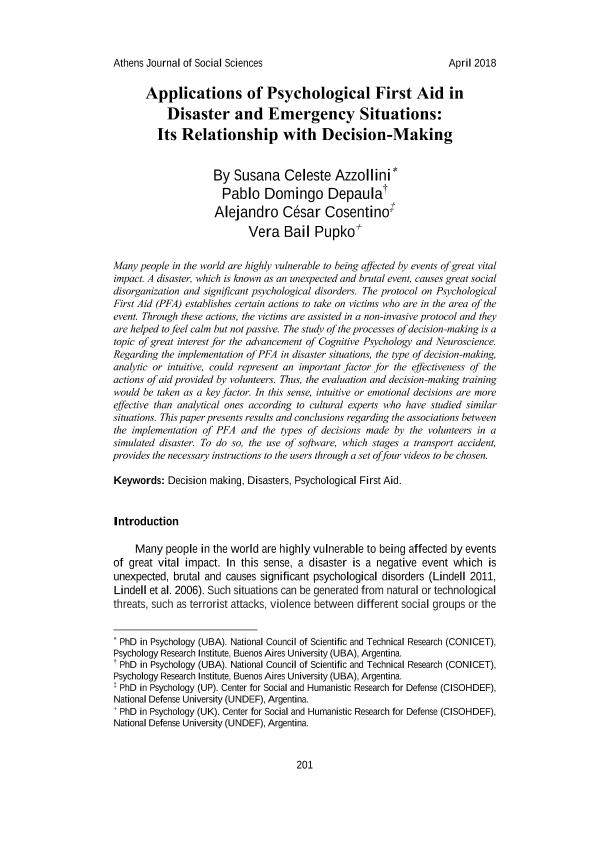Mostrar el registro sencillo del ítem
dc.contributor.author
Azzollini, Susana Celeste

dc.contributor.author
Depaula, Pablo Domingo

dc.contributor.author
Cosentino, Alejandro César

dc.contributor.author
Bail Pupko, Vera

dc.date.available
2022-11-03T18:24:25Z
dc.date.issued
2018-04
dc.identifier.citation
Azzollini, Susana Celeste; Depaula, Pablo Domingo; Cosentino, Alejandro César; Bail Pupko, Vera; Applications of Psychological First Aid in Disaster and Emergency Situations: Its Relationship with Decision-Making; Athens Institute for Education & Research; Athens Journal of Social Sciences; 5; 2; 4-2018; 201-213
dc.identifier.uri
http://hdl.handle.net/11336/176309
dc.description.abstract
Many people in the world are highly vulnerable to being affected by events of great vitalimpact. A disaster, which is known as an unexpected and brutal event, causes great socialdisorganization and significant psychological disorders. The protocol on PsychologicalFirst Aid (PFA) establishes certain actions to take on victims who are in the area of theevent. Through these actions, the victims are assisted in a non-invasive protocol and theyare helped to feel calm but not passive. The study of the processes of decision-making is atopic of great interest for the advancement of Cognitive Psychology and Neuroscience.Regarding the implementation of PFA in disaster situations, the type of decision-making,analytic or intuitive, could represent an important factor for the effectiveness of theactions of aid provided by volunteers. Thus, the evaluation and decision-making trainingwould be taken as a key factor. In this sense, intuitive or emotional decisions are moreeffective than analytical ones according to cultural experts who have studied similarsituations. This paper presents results and conclusions regarding the associations betweenthe implementation of PFA and the types of decisions made by the volunteers in asimulated disaster. To do so, the use of software, which stages a transport accident,provides the necessary instructions to the users through a set of four videos to be chosen.
dc.format
application/pdf
dc.language.iso
eng
dc.publisher
Athens Institute for Education & Research
dc.rights
info:eu-repo/semantics/openAccess
dc.rights.uri
https://creativecommons.org/licenses/by-nc-sa/2.5/ar/
dc.subject
DECISION MAKING
dc.subject
DISASTERS
dc.subject
PSYCHOLOGICAL FIRST AID
dc.subject.classification
Psicología

dc.subject.classification
Psicología

dc.subject.classification
CIENCIAS SOCIALES

dc.title
Applications of Psychological First Aid in Disaster and Emergency Situations: Its Relationship with Decision-Making
dc.type
info:eu-repo/semantics/article
dc.type
info:ar-repo/semantics/artículo
dc.type
info:eu-repo/semantics/publishedVersion
dc.date.updated
2022-11-01T23:18:20Z
dc.identifier.eissn
2241-7737
dc.journal.volume
5
dc.journal.number
2
dc.journal.pagination
201-213
dc.journal.pais
Grecia

dc.journal.ciudad
Atenas
dc.description.fil
Fil: Azzollini, Susana Celeste. Universidad de Buenos Aires. Facultad de Psicología. Instituto de Investigaciones; Argentina. Consejo Nacional de Investigaciones Científicas y Técnicas; Argentina
dc.description.fil
Fil: Depaula, Pablo Domingo. Consejo Nacional de Investigaciones Científicas y Técnicas; Argentina. Universidad de Buenos Aires. Facultad de Psicología. Instituto de Investigaciones; Argentina
dc.description.fil
Fil: Cosentino, Alejandro César. Universidad de Buenos Aires. Facultad de Psicología; Argentina
dc.description.fil
Fil: Bail Pupko, Vera. Universidad de Buenos Aires. Facultad de Psicología. Instituto de Investigaciones; Argentina
dc.journal.title
Athens Journal of Social Sciences
dc.relation.alternativeid
info:eu-repo/semantics/altIdentifier/url/https://www.athensjournals.gr/social/2018-5-2-5-Azzollini.pdf
Archivos asociados
